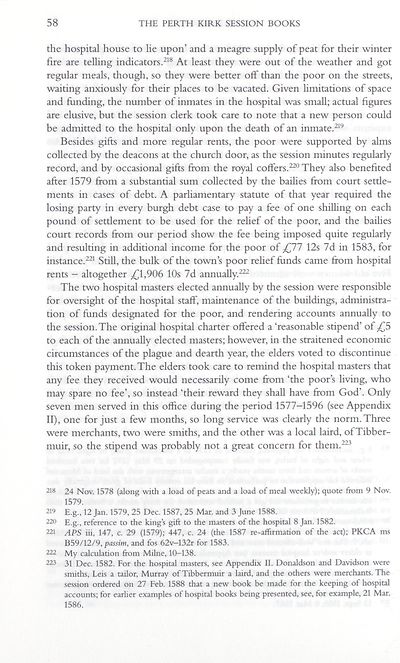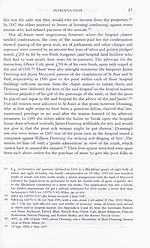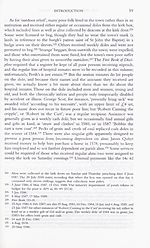Series 6 > Perth Kirk Session books, 1577-1590
(73) Page 58
Download files
Complete book:
Individual page:
Thumbnail gallery: Grid view | List view

58
THE PERTH KIRK SESSION BOOKS
the hospital house to lie upon’ and a meagre supply of peat for their winter
fire are telling indicators.218 At least they were out of the weather and got
regular meals, though, so they were better off than the poor on the streets,
waiting anxiously for their places to be vacated. Given limitations of space
and funding, the number of inmates in the hospital was small; actual figures
are elusive, but the session clerk took care to note that a new person could
be admitted to the hospital only upon the death of an inmate.219
Besides gifts and more regular rents, the poor were supported by alms
collected by the deacons at the church door, as the session minutes regularly
record, and by occasional gifts from the royal coffers.220 They also benefited
after 1579 from a substantial sum collected by the baihes from court setde-
ments in cases of debt. A parliamentary statute of that year required the
losing party in every burgh debt case to pay a fee of one shifting on each
pound of setdement to be used for the relief of the poor, and the bailies
court records from our period show the fee being imposed quite regularly
and resulting in additional income for the poor of £11 12s 7d in 1583, for
instance.221 Still, the bulk of the town’s poor relief funds came from hospital
rents - altogether .£1,906 10s 7d annually.222
The two hospital masters elected annually by the session were responsible
for oversight of the hospital staff, maintenance of the buildings, administra¬
tion of funds designated for the poor, and rendering accounts annually to
the session. The original hospital charter offered a ‘reasonable stipend’ of £5
to each of the annually elected masters; however, in the straitened economic
circumstances of the plague and dearth year, the elders voted to discontinue
this token payment. The elders took care to remind the hospital masters that
any fee they received would necessarily come from ‘the poor’s living, who
may spare no fee’, so instead ‘their reward they shall have from God’. Only
seven men served in this office during the period 1577-1596 (see Appendix
II), one for just a few months, so long service was clearly the norm. Three
were merchants, two were smiths, and the other was a local laird, ofTibber-
muir, so the stipend was probably not a great concern for them.223
218 24 Nov. 1578 (along with a load of peats and a load of meal weekly); quote from 9 Nov.
1579.
219 E.g., 12 Jan. 1579, 25 Dec. 1587, 25 Mar. and 3 June 1588.
220 E.g., reference to the king’s gift to the masters of the hospital 8 Jan. 1582.
221 APS iii, 147, c. 29 (1579); 447, c. 24 (the 1587 re-affirmation of the act); PKCA ms
B59/12/9, passim, and fos 62v-132r for 1583.
222 My calculation from Milne, 16-138.
223 31 Dec. 1582. For the hospital masters, see Appendix II. Donaldson and Davidson were
smiths, Leis a tailor, Murray of Tibbermuir a laird, and the others were merchants. The
session ordered on 27 Feb. 1588 that a new book be made for the keeping of hospital
accounts; for earlier examples of hospital books being presented, see, for example, 21 Mar.
1586.
THE PERTH KIRK SESSION BOOKS
the hospital house to lie upon’ and a meagre supply of peat for their winter
fire are telling indicators.218 At least they were out of the weather and got
regular meals, though, so they were better off than the poor on the streets,
waiting anxiously for their places to be vacated. Given limitations of space
and funding, the number of inmates in the hospital was small; actual figures
are elusive, but the session clerk took care to note that a new person could
be admitted to the hospital only upon the death of an inmate.219
Besides gifts and more regular rents, the poor were supported by alms
collected by the deacons at the church door, as the session minutes regularly
record, and by occasional gifts from the royal coffers.220 They also benefited
after 1579 from a substantial sum collected by the baihes from court setde-
ments in cases of debt. A parliamentary statute of that year required the
losing party in every burgh debt case to pay a fee of one shifting on each
pound of setdement to be used for the relief of the poor, and the bailies
court records from our period show the fee being imposed quite regularly
and resulting in additional income for the poor of £11 12s 7d in 1583, for
instance.221 Still, the bulk of the town’s poor relief funds came from hospital
rents - altogether .£1,906 10s 7d annually.222
The two hospital masters elected annually by the session were responsible
for oversight of the hospital staff, maintenance of the buildings, administra¬
tion of funds designated for the poor, and rendering accounts annually to
the session. The original hospital charter offered a ‘reasonable stipend’ of £5
to each of the annually elected masters; however, in the straitened economic
circumstances of the plague and dearth year, the elders voted to discontinue
this token payment. The elders took care to remind the hospital masters that
any fee they received would necessarily come from ‘the poor’s living, who
may spare no fee’, so instead ‘their reward they shall have from God’. Only
seven men served in this office during the period 1577-1596 (see Appendix
II), one for just a few months, so long service was clearly the norm. Three
were merchants, two were smiths, and the other was a local laird, ofTibber-
muir, so the stipend was probably not a great concern for them.223
218 24 Nov. 1578 (along with a load of peats and a load of meal weekly); quote from 9 Nov.
1579.
219 E.g., 12 Jan. 1579, 25 Dec. 1587, 25 Mar. and 3 June 1588.
220 E.g., reference to the king’s gift to the masters of the hospital 8 Jan. 1582.
221 APS iii, 147, c. 29 (1579); 447, c. 24 (the 1587 re-affirmation of the act); PKCA ms
B59/12/9, passim, and fos 62v-132r for 1583.
222 My calculation from Milne, 16-138.
223 31 Dec. 1582. For the hospital masters, see Appendix II. Donaldson and Davidson were
smiths, Leis a tailor, Murray of Tibbermuir a laird, and the others were merchants. The
session ordered on 27 Feb. 1588 that a new book be made for the keeping of hospital
accounts; for earlier examples of hospital books being presented, see, for example, 21 Mar.
1586.
Set display mode to:
![]() Universal Viewer |
Universal Viewer | ![]() Mirador |
Large image | Transcription
Mirador |
Large image | Transcription
Images and transcriptions on this page, including medium image downloads, may be used under the Creative Commons Attribution 4.0 International Licence unless otherwise stated. ![]()
| Scottish History Society volumes > Series 6 > Perth Kirk Session books, 1577-1590 > (73) Page 58 |
|---|
| Permanent URL | https://digital.nls.uk/127281513 |
|---|
| Description | Over 180 volumes, published by the Scottish History Society, containing original sources on Scotland's history and people. With a wide range of subjects, the books collectively cover all periods from the 12th to 20th centuries, and reflect changing trends in Scottish history. Sources are accompanied by scholarly interpretation, references and bibliographies. Volumes are usually published annually, and more digitised volumes will be added as they become available. |
|---|


